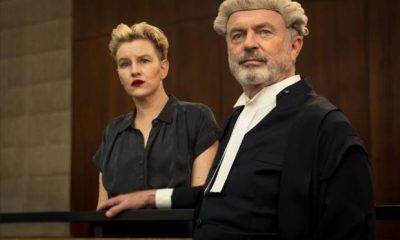Features
Alfred Hitchcock. the master manipulator
Fade in on a big-bellied silhouette, the caricature of a dignified man. Cue sinister music — “The Funeral March of the Marionettes” — its rhythm a smirking overture to perverse entertainment. Enter a portly fellow who fills the caricature and greets us with the relish of a gourmet tasting every vowel: “Goo-ood Eve-ning.”
It may seem odd to begin a celebration of Alfred Hitchcock with a description of his ’50s TV persona, given that he is valued as one of the greatest directors in cinema history. To my mind, though, this represents the key to understanding Hitch. For his persona, like his films, was both witty and menacing; a perfectly calculated construction that solidified Hitchcock’s image as a master manipulator.
Walt Disney may have had the more potent household name, but then Disney was always more sorcerer than storyteller; a grandfatherly magician who could conjure cartoons and theme parks with a wave of his hand. Hitchcock, on the other hand, was something subtler: a droll master of the deadpan tease who directed his audience as much as he did his films.
The Early Years
In the 1920s, Hitchcock trained as an art assistant in the German film industry, where he was profoundly influenced by the expressionist aesthetics of such master filmmakers as F.W. Murnau and Fritz Lang. (Compare Lang’s 1932 marvel, M, with Hitchcock’s Psycho, and notice the heart-rending air of tragedy both films generate around their murderous heroes.) When Hitchcock began to direct, he was obliged to wrestle with any number of workman-like romances and dialogue-heavy melodramas, yet his darkly comic personality and cinematic genius quickly asserted themselves. From the beginning of his career, Hitchcock excelled at using atmosphere to propel a story.
The LodgerThe Lodger
In The Lodger (1926), the mysterious tenant of a claustrophobic rooming house emerges from the ghostly London fog and trudges up to his room, where the heavy tread of his boots distracts his nervous housemates from their dinner. In a wonderful bit of pure Hitchcock, the diners look up from the table, and the ceiling above dissolves (a clever trick involving a glass floor) into a clear view of the mystery man, pacing in nervous circles.
Blackmail (1929), which was otherwise encumbered with the technical burdens of being Hitchcock’s first sound film, contains an exhilarating chase across the rooftops of the British Museum. And even though a static talkie like Juno and the Paycock (1930) might be treasured more as a document of Dublin’s legendary Abbey players performing a Sean O’Casey play, it nevertheless contains a moment — a spooky view from a high window of two hit-men pacing a courtyard — where Hitchcock’s future mastery is visible in embryo.
The Classic British Films
Hitchcock came into his own with the first version of The Man Who Knew Too Much (1934), a film he later remade in the ’50s with Jimmy Stewart and Doris Day. Compare the two versions: the key sequence (in which a gunman takes aim at a head of state from the curtained box of a crowded concert hall) is identical, shot for shot. Hitchcock had found the style he would keep for life — a species of silent cinema in which sound played a complementary part, but the visuals did the heavy lifting. The 39 Steps
The 39 Steps
The 39 Steps (1935) introduces the essential Hitchcock hero — pioneered here by Robert Donat, later perfected by Cary Grant — an innocent man in such complicated jeopardy that he’s on the run from both police and criminals. The Lady Vanishes (1938) breaks new ground by blending suspense with character-driven comedy. The heiress (Margaret Lockwood) is too classically madcap to be taken seriously by her fellow train passengers when she stumbles into danger, and Hitchcock skillfully makes both humorous and nerve-tingling use of her frustration.
RebeccaHitchcock in America
In the early 1940s, a career in the United States beckoned, and with it followed over a dozen increasingly polished, exquisitely suspenseful pictures. Several of these would still be considered classics, even without the benefit of the Hitchcock brand-name: the Oscar®-winning Rebecca (the only Hitchcock film to win Best Picture honors) (1940), produced by David Selznick; Shadow of a Doubt (1943), written by Thornton Wilder; and Lifeboat (1944), starring Tallulah Bankhead. In each, Hitchcock’s style subverts even the talkiest scenes, making otherwise mundane chit-chat unforgettable.
The Hitchcock touch grew during a 15-year span abounding in superb moments and offbeat experiments. There’s the plane crash in Foreign Correspondent (1940), the fistfight atop the Statue of Liberty in Saboteur (1942), and Cary Grant’s menacing walk to his wife’s bedroom, evil-glowing glass of milk in hand, in Suspicion (1941). There’s also the startling dream sequence in Spellbound (1945), designed by Salvador Dali, and the breathtaking crane shot in Notorious (1946) that glides down from a balcony to steal a close-up of a key hidden in the hand of Ingrid Bergman. Rope (1948) appears to take place over the course of a single 90-minute tracking shot. Rear Window (1954) plants us in a wheelchair next to Jimmy Stewart, with little to do but watch his neighbors. We all become voyeurs with him — inevitably, getting a witty comeuppance. Strangers on a Train
The Great Hitchcock
If, as many hold true, Hitchcock’s greatest period was the 1950s, then it began with Strangers on a Train (1950). This wonderful nightmare mixes double murder and tennis doubles. Its witty visual schemes and dizzy merry-go-round chase orbit Robert Walker’s brilliant, demonic performance as a sexually ambiguous villain.
In the dark masterpiece Vertigo (1957), Jimmy Stewart suffers a fear of heights that becomes a dreamlike piece of his passion for Kim Novak. The Golden Gate Bridge, a forest of ancient redwoods, and a Spanish mission bell all tower over our hero’s romantic obsessions, as if taunting him to try for greater heights — to live a little, even if it kills him. In North by Northwest (1959), Cary Grant plays a man with a semi-existence. Mistaken for someone else, he is forced, like the hero of The Thirty Nine Steps, to flee both the cops and the bad guys. To make good his escape, he must pretend to be the man for whom he’s been mistaken; and for his trouble winds up dangling from the stony eyebrow of Abe Lincoln atop Mount Rushmore — a perfect climax to a comedic spy-thriller about identity. Psycho (1960) puts a much darker spin on identity when the meek Norman Bates and his killer mom memorably and terrifyingly blur into one person.
After the Masterpieces
These films comprise Hitchcock’s crucial masterpieces. It was as if the success of his television show (1955-65), having endowed him with a public identity, freed him to tap-dance at the edge of his most private abyss.
The Birds (1963), a movie about the end of the world that had the bad luck to come out not long after the Cuban missile crisis, was panned by critics and shunned at the box office, but is arguably Hitchcock’s final masterpiece. Federico Fellini hailed it as “an apocalyptic poem,” and Camille Paglia, in a superb monograph written for the British Film Institute, called it “a perverse ode to woman’s sexual glamour.” The luminous heiress played by Tippi Hedren is such a happy paragon of self-love, of identity so greedily fulfilled, that all of nature rises up to cut her down to size.
After The Birds, Hitchcock’s powers undoubtedly waned, though Marnie (1965), Frenzy (1972), and Family Plot (1976) all contain ample Hitchcockian touches that make them worthwhile viewing. Ultimately, perhaps his greatest legacy is not so much the films he made as the following that he engendered. After all, where would any filmmaker be without him? Where would we be, as an audience? Fortunately, these are questions we’ll never have to answer. One need only to watch any Hitchcock film to know that our century is immeasurably richer for his having been here.










































